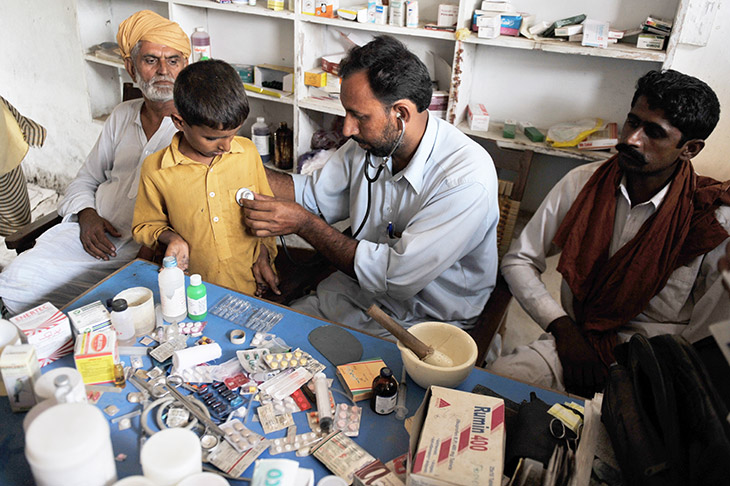The greatest challenges facing our ability to advance the human right to health are not medical but cultural, economic, environmental, political, and social. Health is the sum of empowering education, adequate nutrition, safe environments, social support, and community cohesion. Rights are a way to mobilise and empower the disadvantaged, and in many parts of the world this is their principal function. The language of rights makes people conscious of both their oppression and the possibility of change. A human rights approach assumes a trade-off, in which the political system provides the security of a health care entitlement in exchange for the people accepting limits on the benefits that are publicly funded.
Further, using a human rights approach also implies that entitlement is universal. This means there is no exclusion from the provisions made to assure health care on any grounds – purchasing power, employment status, residence, religion, caste, gender, disability, or any other basis of discrimination. But this does not discount the special needs of disadvantaged and vulnerable groups who may need special entitlements through affirmative action to rectify historical inequities suffered by them. Establishing universal health care through the human rights route is the best way to fulfill the obligations mandated by international law and domestic Constitutional provisions. International law, specifically the International Covenant on Economic, Social and Cultural Rights (ICESCR) and the Alma Ata Declaration, among others, provide the basis for the core content of the right to health and health care. But country situations are very different and hence there should not be a global core content, the right to health needs to be country specific. Because a human right is a universal entitlement, an important way that its implementation may be measured is by the degree to which it benefits those who hitherto have been the most disadvantaged and vulnerable and brings them up to mainstream standards.
The right to healthcare is primarily a claim to entitlement, a positive right, and not a protective fence. The right to health, like all human rights, imposes three types or levels of obligations on the states’ parties: the obligations to respect, protect and fulfil. In turn, the obligation to fulfil contains obligations to facilitate, provide and promote. The emphasis needs to shift from ‘respect’ and ‘protect’ to focus more on ‘fulfil’. For the right to be effective, optimal resources that are needed to fulfil the core obligations have to be made available and utilized effectively. The obligation to fulfil requires states to adopt appropriate legislative, administrative, budgetary, judicial, and promotional and other measures towards the full realization of the right to health. The obligation to fulfil requires states’ parties, inter alia, to give sufficient recognition to the right to health in the national political and legal systems, preferably by way of legislative implementation, and to adopt a national health policy with a detailed plan for realizing the right to health. The obligation to fulfil (facilitate) requires states inter alia to take positive measures that enable and assist individuals and communities to enjoy the right to health. The obligation to respect requires states to refrain from interfering directly or indirectly with the enjoyment of the right to health.
The right to health includes, inter alia, a government obligation to take measures ensuring equal access to health care and health-related services provided by third parties; and to ensure that privatization of the health sector does not constitute a threat to the availability, accessibility, acceptability and quality of health facilities, goods and services.
The right to health is interpreted as an inclusive right, extending not only to timely and appropriate health care, but also to the underlying determinants of health, such as access to safe and potable water and adequate sanitation, an adequate supply of safe food, nutrition and housing, healthy occupational and environmental conditions, and access to health-related education and information, including on sexual and reproductive health.
Health Care as a Right: With 260 million Indian citizens still below the poverty line and without the fundamental assurance of healthcare, the right to health clearly is of particular importance in our country. The World Health Organization (WHO) rankings place India as 112th on the list of 199 member countries with regard to its health care system.
Recently Article 21 of the Indian Constitution has been interpreted to incorporate the right to health in right to life and hence this right having now acquired a Constitutional status through judicial activism, can be judicially enforced. The Directive Principles of State Policy provide against the exploitation of weaker sections of society, including children, and mandate the State to raise the levels of nutrition and the standard of living and improve public health.
Judicial Interventions: The Constitution of India has specific provisions that relate to the right to health. They are the Directive Principles of State Policy – Articles 42 and 47 – and are therefore nonjusticiable. Article 42 and Article 47 are the guidelines that the State must use to achieve certain standards of living for its citizens. Although the Directive Principles of State Policy are a compelling argument for the right to health, there needs to be be a clearly defined right to health so that individuals can have this right enforced and violations can be redressed.
The Indian judiciary has interpreted the right to health in many ways, e.g., through Public Interest Litigation as well as litigation arising out of claims that individuals have made on the State, with respect to health services.
The issue of adequacy of medical health services was addressed in quite a number of cases decided by the Supreme Court. It has been held, for example, that failure on the part of a government hospital or health centre to provide timely medical treatment to a person in need of such treatment results in violation of his right to life guaranteed under Article 21.
It has also been held that the lack of financial resources cannot be a reason for the State to shy away from its Constitutional obligation. This would then imply that the right to life includes the right to primary health care. With regard to maintaining a clean environment, which is critical to a person’s health, there are many questions that courts have deliberated on. It was held by the court that a public body constituted for the principal statutory duty of ensuring sanitation and health is not entitled to immunity on breach of this duty.
The question that must be discussed more thoroughly is whether an amendment to the Constitution, which will state the fundamental right to health, is desirable. Enumerated rights have an edge over wider interpretations of existing rights, as states can be held accountable for violations. However, the extensive case law that is available does not ensure that health care facilities and public health standards ensuring health are guaranteed to every citizen.
Need for New Strategy: As noted above, the right to healthcare is primarily a claim to an entitlement, a positive right, not a protective fence. Any amendment guaranteeing the right to health should have a focus on primary health care, which is preventive and curative. It should also have a special focus on the health of women – more specifically on their reproductive health, on prenatal health care.
In India’s case a certain trajectory has been followed through the policy route, which we need to sort out and fit into a new strategy.
The existing public health system can be characterised as follows:
- A very large and unregulated private health sector;
- A declining public health care system which provides selective care through a multiplicity of schemes and programs, and discriminates on the basis of residence (rural-urban) in providing for entitlements for healthcare;
- Great inequities in access to healthcare based on employment status and purchasing power;
- Inadequate development of various pre-conditions of health, like water supply and sanitation, environmental health; hygiene and access to food;
- Declining investments and expenditure in public health; and
- Inequitably distributed infrastructure and health staff
Thus the operationalisation of the right to healthcare will have to be developed keeping in mind current deficiencies, and how we need to change them.
Towards an Efficient System: To establish the right to healthcare from the above scenario, certain first essential steps will be necessary:
- Equating directive principles with fundamental rights through a Constitutional amendment;
- Incorporating a National Health Act (similar to the Canada Health Act) which will organise the present healthcare system under a common umbrella organisation as a public-private mix governed by an autonomous National Health Authority which will also be responsible for bringing together all resources under a single-payer mechanism;
- Development of a strategy for pooling all financial resources deployed in the health sector;
- Redistribution of existing health resources, public and private, on the basis of standard norms (these would have to be specified) to assure regional equity. Local governments should be given the autonomy to use these resources as per local needs but within a broadly defined policy framework of public health goals;
- Essential drugs as per the WHO list should be brought back under price control (subject to the recent patent act provisions) so that availability of such drugs is assured at affordable prices and within the public health system;
- Strengthen the health information system and database to facilitate better planning as well as audit and accountability;
The Way Ahead: The Government of India has been unable to fulfil its commitment of “Health For All By 2000 A.D.”; in fact, primary health care services are becoming more and more difficult to obtain, especially for those living in urban slums, villages or remote tribal regions. The poor conditions in government hospitals are also worsening day by day. There is the inadequate staff; the supply of medicines is also insufficient coupled with inadequate infrastructure. Also, there are financial constraints on the State.
What is of utmost importance is that the overall goal should be to move towards a system where citizens are assured access to basic health care, irrespective of their capacity to pay. A number of countries in the world have made provisions in this direction, ranging from the Canadian System Of Universal Health Care to the Cuban System of Health Care for Every Citizen. The time is ripe to have a system of universal social health insurance. This admirable yet vague intention needs to be converted into concrete action by means of strong and sustained support by various sections of civil society, coupled with concrete proposals to functionalised universal access to health care.
In this context, ensuring the right to health care for all is not an unrealistic scenario, but has become an imperative for a nation which as the ‘world’s largest democracy, claims to accord certain basic rights to its citizens, including the right to life in its broadest sense.
On a practical level, health workers may wonder about the applicability or utility (“added value”), let alone necessity of incorporating human rights perspectives into their work. Attention to the intersection of health and human rights may provide practical benefits to those engaged in health or human rights work, may help reorient thinking about major global health challenges, and may contribute to broadening human rights thinking and practice.
It would suffice here to end with a quote in Sanskrit,
‘Shareeram madhyam khalu dharma sadhanam’ – ‘Without a healthy body, one cannot pursue any other religion successfully’
The authors are fourth-year students of the National Law Institute, Bhopal
This was first published in the print edition of Manushi journal, Issue no. 152 of 2006.

